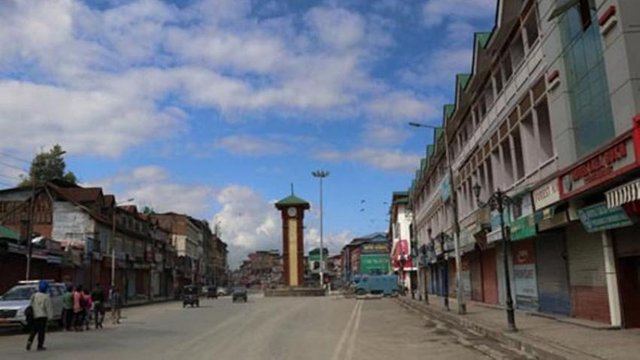(31.68) All-around strike in Kashmir, round-the-clock protesting civilian killings
On Thursday, an all-out resistance or strike was observed in protest against the assassination of civilians including senior journalist Sayyed Sujith Bukhari in India-controlled Jammu and Kashmir. As a result of the strike, shops, commercial establishments and educational institutions were closed on the day. Although some private cabs and three wheels of vehicles were sporadically moved on different routes, the presence of people on the road was very low.

Curfew restrictions have been issued in the downtown area of Srinagar as a precautionary measure from the administration on the morning of the strike. Hurriyat Conference Chairman Sayyed Ali Shah Geelani, Mirwaiz Omar Faruq were arrested and JK ALF Chairman Muhammad Yasin Malik was arrested.
Security forces have been deployed on the road of Sopore, Handwara, Patan, Sambal, Hajin and other areas of north Kashmir. All educational institutions, commercial establishments and public transport system in Sopore, Baramulla, Pattan and Rafiabad area are closed. Likewise, the alluvial forests of Sopian, Pulwama, Kulgam and Anantnag in South Kashmir have been celebrated.
On behalf of the coordinated joint resistance leader of Sayyid Ali Shah Geelani, Mir Wise Omar Farooq and Muhammad Yasin Malik, the call was called on Thursday in the valley to protest the killing of prominent senior journalist Sujith Bukhari and civilians.
Bhanu Sarkar, a member of the editorial of West Bengal's prisoner release committee, said, "After the 90's, especially in Kashmir, the army killed 98 thousand ordinary people, disappeared, at least seven thousand mass grabs were found. Following the assassination of Burhan Wani, recent incidents of mass protests in Kashmir, destruction of eyes by youngsters of the young children, and 'wasting' their lives athe re consistently going on. As a result, the protest here is normal.
He said, "Kashmir's problems will not be solved by buying guns, guns, cannons, chhara shoots or expensive weapons from abroad. This is a political problem. It can be solved only through discussion. '
Bhanu Sarkar said, "Immediately withdraw the army from Kashmir, repeal of repressive legislation such as insomnia. The government will talk to the protesters. The people of Kashmir, what is their demand, the government should listen. '
Meanwhile, after the interval of a month, the presence of Indian sniper and commandos in Jammu and Kashmir's summer capital Srinagar was noticed. They were apparently gathered there for the purpose of military expedition. The members of the National Security Guard, the elite Special Forces of the Ministry of Home Affairs, were found to be trained in a camp of the border security force in Humhaha area adjacent to Srinagar. After the black-colored uniform, the commandos of the Special Forces are taking part in coordinated drills with other forces.
Nearly two dozen sniper of the National Security Guard House Interaction Team has been trained for the past two weeks. Indian Home Ministry wants to deploy Jawans of the National Security Guard at BSF Station. A senior official, who did not wish to be named, said that he would be deployed in the adjacent areas of the airport when he became highly skilled in anti-hijacking.
Last month, the order of the Interior Ministry was removed from the National Security Guard commandos from Kashmir. Indian media said they will be deployed again in the Valley soon as part of the anti-terror operation. Earlier, Al Jazeera announced that India's military campaign started again against the armed rebels protesting for independence in Kashmir. After the unilateral announcement of a 30-day ceasefire on the occasion of Ramadan, the media said that the campaign started.
Some of the armed rebel organizations in Kashmir are protesting for direct independence. Some people are again in favor of Kashmir's integration with Pakistan. In the aftermath of history, there was a gradual increase in Islamization of the independence movement. Now Hizbul Mujahideen among the rebel organizations is the most active. However, Indian authorities do not recognize the independence movement of Kashmir separately from different militant activities. Many rebels, including suspected militant names, are accused of killing civilians as well as against Indian forces. The problems of 'separatism and militancy' are seen in the context of the entire Indian stand on the Kashmir issue. Indian forces continue security operations against Kashmiri rebels